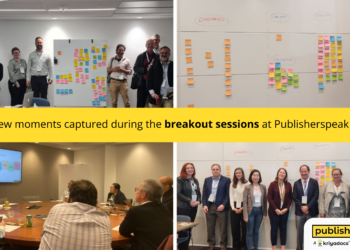(Please be aware, this article was posted on April 1st)
The Scholarly Kitchen is closing its toll gates tomorrow. After three years of blogging, the writing team behind the popular (and Webby-nominated) blog feels its work has achieved enough renown and reputation to command a fair price on the information market.
In the words of one blogger, “If a pay wall is good enough for the New York Times, it’s good enough for us.”
The Chefs will be offering a menu of payment options to our devoted readers. Annual metered subscriptions — named to be in keeping with our kitchen motif — will be available in several flavors, including:
- Demitasse: Read half of each post. $25 per month.
- Shots: Read three straight posts quickly — bang, bang, bang — and the next three will not make sense. $50 per month.
- Vente: Read all posts, become jittery. $75 per month.
In anticipation of a paying clientele, the Chefs have prepared some groundbreaking posts on topics and research sure to interest professionals across the spectrum of scholarly communication:
- Blood Samples Confirm Midichlorians of Publishers Come From Dark Side
- When Nature Calls — Science Publisher Launches Nature Urology & Scatology
- “I Thought It Was Tofu!” — Open Access Evangelist and Vegetarian, Stevan Harnad, Caught in Burger Joint
- Study Finds Librarians Really Are the Sexiest, Wittiest, and Nicest People in the World
The decision to erect a pay wall didn’t come easily to the Chefs. But a decisive Excel spreadsheet provided by Joe Esposito — who immediately claimed he was not performing premature quantification — clinched the deal. The other option — an author-pays model — was dismissed amidst rollicking laughter at the blog’s first business meeting, after Phil Davis turned his pockets out with a winsome smile.
“I’ve always enjoyed the work for its own sake,” said David Crotty. “But at the end of the day, a boy’s gotta eat!”
The Society for Scholarly Publishing played no role in the decision, leaving the business model and attendant revenues to the authors of the Scholarly Kitchen.
“We felt it best to let the writers determine the value of what they produce,” said Lois Smith, President of the SSP. “We think it’s priceless, but apparently, they think less of it than we do.”
With the decisive spreadsheet in hand, the Chefs have already secured loans from a large financial institution to erect a headquarters building just outside of Washington, DC. The building is planned to be a multi-purpose affair, with some parts leased out to lawyers, some given over to conference facilities, and other parts left vacant.
“We wanted it to be like any other publishing building,” said one Chef, wishing to remain nameless. “There’s something reassuring and familiar about it. Empty halls. Underutilized vastness. Feels like home . . . ”
The business plan also has a contingency built in to account for the possibility that nobody pays. Dubbed the SQS (status quo scenario), it simply means that the Chefs continue to work for nothing but fame and glory. Significantly, this tab on the spreadsheet is the only one we printed out.

Discussion
20 Thoughts on "The Free Lunch Is Over: Scholarly Kitchen to Erect Pay Wall Tomorrow"
SSP Membership? $135. The Scholarly Kitchen? Priceless.
Maybe I will cancel my subscription to the Journal of Universal Rejection to pay for this. For all its prestige I’m thinking I’m not really getting much for $500 a month.
I just read to the bottom and saw the bit about the contingency plan. That was not covered in our business meeting. Does this mean that I should cancel the order I just put in for the foosball table for Scholarly Kitchen Headquarters?
This has to be April’s Fool!!
I really wish you’d consider more innovative approaches to generating revenue than a paywall. Any truth to the rumor you’re shopping a treatment for a Food Channel series? Or a branded line of Cuisinart-made Scholarly Kitchen appliances, like a high-speed content mixer that always leaves room at the top for ads? These seem far more clever than a paywall, with a lot more upside (sales through Amazon, QVC, for example). Please keep us informed.
We did consider a cookbook of recipes based on scholarly findings:
* Double-helix-stuffed Oreos
* Cream of stem-celery soup
* Chlorophyll cheesecake
* Trivalent venison in string theory sauce
Unfortunately, our test kitchen is now in a parallel universe, along with a bunch of mutated ducks. Don’t ask. It was a very unpleasant hour.
Trivalent Venison…isn’t that the name of a Swedish metal band?
I checked around, and this is absolutely not an April’s Fool joke.
In fact, the institutional pricing will be announced tomorrow, according to my sources.
This is probably a good thing for everyone involved.
Finally, I’ll be able to get some work done. This came just in time, before my employer noticed that I spend all my time reading and commenting on The Scholarly Kitchen.
Nice try on a fool’s day. I will be looking for a retraction tomorrow.
Tomorrow we’ll be announcing our new “Freemium” strategy. The blog content will be available free as part of a marketing campaign to drum up support for our incredibly expensive lecture tour. We’re thinking a minimum of $50K a talk, and have prepared a tour rider based on the behaviors described in the Led Zeppelin biography “Hammer of the Gods”.
I suggest, as a theme song, “The Well.” No wait, that was Pink Floyd. . . .
Put me down for two!
I won’t subscribe until Phil Davis tells us what the Impact Factor of SK is, and whether its OA success can be attributed in part to its resulting in increased citations.




